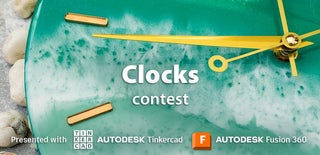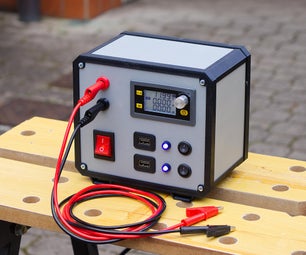Introduction: Make a Vintage Looking Wooden Digital Clock
This is an old looking vintage digital clock. This clock is made up of wood and completely digital. This clock can run for about a week (7 consecutive days) in a single charge. It uses an ATmega328P microcontroller which uses Arduino IDE for programing.
Supplies
- Arduino UNO (for testing purpose only)
- ATmega328P
- DS1307 RTC Module
- Dot Matrix Display Module
- Push Buttons
- TP4056 Charging module
- Lithium ion battery
Step 1: Cutting Woods for the Frame
First take the pieces of wood and mark them. The using a handsaw cut them precisely so that they fit each other perfectly.
Step 2: Making Holes for Buttons
After cutting each of the pieces, measure the correct dimensions of the boxes using a vernier caliper. Then mark it on the wood and cut it using a drill and shape it with the help of a file.
Step 3: Gluing the Woods
When all the wooden pieces are ready, glue them using wood glue (fevicol). Then attatch the pieces and let them dry for 24 hours.
Step 4: Shape the Box
When the pieces are attached well, cut the excess wood.
Then using a file and some sand papers smoothed the box. This will give a clean look to the box.
For better look polish the box with some oil or glyser liquid.
Step 5: Electronics
First using an Arduino UNO we tested the system. Then to fit all the electronics replace the Arduino with an ATmega328P microcontroller. This will reduce the size and work perfectly. Then add the battery to the RTC Module.
Step 6:
After programing the microcontroller, put the electronics inside the box. Then attach the buttons to the box with some super glue.
Finally attach the display to the box with double sided tape. Then to illuminate the light of the display, put the black glass infront of the display.
Step 7: Closing the Box
Then attach the front panel over the glass with some super glue.
Then on the back side attach the charging circuit and the switch.
Then attach the back panel with some screw. Before closing the back panel, attach the battery to the circuit.
Step 8: Circuit Diagram and Code
#define USE_DS1307
// Header file includes
#include <MD_Parola.h>
#include <MD_MAX72xx.h>
#include <SPI.h>
#include <Wire.h>
#include <MD_DS1307.h>
#include "Font_Data.h"
// Define the number of devices we have in the chain and the hardware interface
// NOTE: These pin numbers will probably not work with your hardware and may
// need to be adapted
#define HARDWARE_TYPE MD_MAX72XX::FC16_HW
#define MAX_DEVICES 8
#define CLK_PIN 13
#define DATA_PIN 11
#define CS_PIN 10
// HARDWARE SPI
MD_Parola P = MD_Parola(HARDWARE_TYPE, CS_PIN, MAX_DEVICES);
// SOFTWARE SPI
//MD_Parola P = MD_Parola(HARDWARE_TYPE, DATA_PIN, CLK_PIN, CS_PIN, MAX_DEVICES);
volatile boolean buttonA = false;
volatile boolean buttonB = false;
volatile boolean buttonC = false;
int StateOfbuttonA = 0;
int StateOfbuttonB = 0;
int StateOfbuttonC = 0;
int NewStateOfbuttonA = 0;
int NewStateOfbuttonB = 0;
int NewStateOfbuttonC = 0;
int temp;
int Humi;
int Mode = 0;
int contrast = 0;
int SPEED_TIME = 75;
#define PAUSE_TIME 0
#define MAX_MESG 20
// Global variables
char szTime[9]; // hh:mm
char szsecond[4]; // ss
char szMesg[MAX_MESG+1] = "";
uint8_t degC[] = { 6, 3, 3, 56, 68, 68, 68 }; // Deg C
char *mon2str(uint8_t mon, char *psz, uint8_t len)
// Get a label from PROGMEM into a char array
{
const __FlashStringHelper* const Jan = F("Jan");
const __FlashStringHelper* const Feb = F("Feb");
const __FlashStringHelper* const Mar = F("Mar");
const __FlashStringHelper* const Apr = F("Apr");
const __FlashStringHelper* const May = F("May");
const __FlashStringHelper* const Jun = F("Jun");
const __FlashStringHelper* const Jul = F("Jul");
const __FlashStringHelper* const Aug = F("Aug");
const __FlashStringHelper* const Sep = F("Sep");
const __FlashStringHelper* const Oct = F("Oct");
const __FlashStringHelper* const Nov = F("Nov");
const __FlashStringHelper* const Dec = F("Dec");
const __FlashStringHelper* str[] =
{
Jan, Feb, Mar, Apr,
May, Jun, Jul, Aug,
Sep, Oct, Nov, Dec
};
strncpy_P(psz, (const char PROGMEM *)str[mon-1], len);
psz[len] = '';
return(psz);
}
char *dow2str(uint8_t code, char *psz, uint8_t len)
{
const __FlashStringHelper* const Sunday = F("Sunday");
const __FlashStringHelper* const Monday = F("Monday");
const __FlashStringHelper* const Tuesday = F("Tuesday");
const __FlashStringHelper* const Wednesday = F("Wednesday");
const __FlashStringHelper* const Thursday = F("Thursday");
const __FlashStringHelper* const Friday = F("Friday");
const __FlashStringHelper* const Saturday = F("Saturday");
const __FlashStringHelper* str[] =
{
Sunday, Monday, Tuesday,
Wednesday, Thursday,Friday,
Saturday ,Sunday
};
strncpy_P(psz, (const char PROGMEM *)str[code-1], len);
psz[len] = '';
return(psz);
}
void getTime(char *psz, bool f = true)
// Code for reading clock time
{
RTC.readTime();
sprintf(psz, "%02d%c%02d", RTC.h, (f ? ':' : ' '), RTC.m);
}
void getTim(char *psz, bool f = true)
// Code for reading clock time
{
RTC.readTime();
sprintf(psz, "%02d%c%02d", RTC.h, ':', RTC.m);
}
void getDate(char *psz)
// Code for reading clock date
{
char szBuf[10];
RTC.readTime();
sprintf(psz, "%d %s %04d", RTC.dd, mon2str(RTC.mm, szBuf, sizeof(szBuf)-1), RTC.yyyy);
}
void getsecond(char *psz)
// Code for reading clock date
{
char szBuf[10];
RTC.readTime();
sprintf(psz, "%02d", RTC.s);
}
void gethh(char *psz, bool f = true)
// Code for reading clock time
{
RTC.readTime();
sprintf(psz, "%c%02d%c%02d", (f ? ':' : ' '), RTC.h, (f ? ':' : ' '), RTC.m);
}
void getmin(char *psz, bool f = true)
// Code for reading clock time
{
RTC.readTime();
sprintf(psz, "%02d%c%02d%c", RTC.h, (f ? ':' : ' '), RTC.m, (f ? ':' : ' '));
}
void getsec(char *psz)
// Code for reading clock date
{
char szBuf[10];
RTC.readTime();
sprintf(psz, "%02d", RTC.s);
}
void getdyy(char *psz)
{
char szBuf[10];
RTC.readTime();
sprintf(psz, "%02d", RTC.dd);
}
void getmon(char *psz)
// Code for reading clock date
{
char szBuf[10];
RTC.readTime();
sprintf(psz, "%s", mon2str(RTC.mm, szBuf, sizeof(szBuf)-1));
}
void getyyyy(char *psz)
// Code for reading clock date
{
char szBuf[10];
RTC.readTime();
sprintf(psz, "%04d", RTC.yyyy);
}
void setup(void)
{
//dht.setup(2); // data pin 2
pinMode(3, INPUT_PULLUP);
pinMode(4, INPUT_PULLUP);
pinMode(5, INPUT_PULLUP);
P.begin(3);
P.setInvert(false);
P.setZone(2, 0, 3);
P.setZone(1, 1, 3);
P.setZone(0, 4, 1);
P.setFont(1, numeric7Se);
P.setFont(0, numeric7Seg);
P.displayZoneText(1, szTime, PA_LEFT, SPEED_TIME, PAUSE_TIME, PA_PRINT, PA_NO_EFFECT);
P.displayZoneText(0, szsecond, PA_LEFT, SPEED_TIME, 0, PA_PRINT, PA_NO_EFFECT);
P.displayZoneText(2, szMesg, PA_CENTER, SPEED_TIME, 0, PA_PRINT, PA_SCROLL_LEFT);
P.addChar('
When this code is uploaded to the Arduino board, the current time is displayed. The buttons can be used to adjust the brightness of the led display and to change the time and date. https://youtu.be/uSOpftD8VwU
, degC);
RTC.control(DS1307_CLOCK_HALT, DS1307_OFF);
RTC.control(DS1307_12H, DS1307_OFF);
getTime(szTime);
}
void loop(void)
{
P.setIntensity(contrast);
NewStateOfbuttonA = digitalRead(3);
NewStateOfbuttonB = digitalRead(4);
NewStateOfbuttonC = digitalRead(5);
buttonAisPressed();
buttonBisPressed();
buttonCisPressed();
if (buttonA) {
if (Mode == 0 ) {
buttonA = false;
contrast++;
if (contrast >= 51 ) {
contrast = 50;
}
}
else if (Mode == 1 ) {
buttonA = false;
Mode = 0;
}
else if (Mode == 2 ) {
buttonA = false;
RTC.h++;
if (RTC.h >= 24 ) {
RTC.h = 0;
}
RTC.writeTime();
}
else if (Mode == 3 ) {
buttonA = false;
RTC.m++;
if (RTC.m >= 60 ) {
RTC.m = 0;
}
RTC.writeTime();
}
else if (Mode == 4 ) {
buttonA = false;
RTC.s = 0;
RTC.writeTime();
}
else if (Mode == 5 ) {
buttonA = false;
RTC.dow++;
if (RTC.dow >= 8 ) {
RTC.dow = 1;
}
RTC.writeTime();
P.displayReset(2);
}
else if (Mode == 6 ) {
buttonA = false;
RTC.dd++;
if (RTC.dd >= 32 ) {
RTC.dd = 1;
}
RTC.writeTime();
}
else if (Mode == 7 ) {
buttonA = false;
RTC.mm++;
if (RTC.mm >= 13 ) {
RTC.mm = 1;
}
RTC.writeTime();
}
else if (Mode == 8 ) {
buttonA = false;
RTC.yyyy++;
if (RTC.yyyy >= 2035 ) {
RTC.yyyy = 2015;
}
RTC.writeTime();
}
}
else if (buttonB) {
buttonB = false;
Mode++;
P.displayReset(2);
if (Mode >= 9 ) {
Mode = 0;
}
}
if (buttonC) {
if (Mode == 0 ) {
buttonC = false;
contrast--;
if (contrast <= 0 ) {
contrast = 0;
}
}
else if (Mode == 1 ) {
buttonC = false;
Mode = 0;
}
else if (Mode == 2 ) {
buttonC = false;
RTC.h--;
if (RTC.h <= 0 ) {
RTC.h = 23;
}
RTC.writeTime();
}
else if (Mode == 3 ) {
buttonC = false;
RTC.m--;
if (RTC.m <= 0 ) {
RTC.m = 59;
}
RTC.writeTime();
}
else if (Mode == 4 ) {
buttonC = false;
RTC.s = 0;
RTC.writeTime();
}
else if (Mode == 5 ) {
buttonC = false;
RTC.dow--;
if (RTC.dow <= 0 ) {
RTC.dow = 7;
}
RTC.writeTime();
P.displayReset(2);
}
else if (Mode == 6 ) {
buttonC = false;
RTC.dd--;
if (RTC.dd <= 0 ) {
RTC.dd = 31;
}
RTC.writeTime();
}
else if (Mode == 7 ) {
buttonC = false;
RTC.mm--;
if (RTC.mm <= 0 ) {
RTC.mm = 12;
}
RTC.writeTime();
}
else if (Mode == 8 ) {
buttonC = false;
RTC.yyyy--;
if (RTC.yyyy <= 2010 ) {
RTC.yyyy = 2025;
}
RTC.writeTime();
}
}
if (Mode == 0)
{
static uint32_t lastTime = 0; // millis() memory
static bool flasher = false; // seconds passing flasher
P.displayAnimate();
P.setTextEffect(2, PA_PRINT, PA_NO_EFFECT);
P.getZoneStatus(1);
P.getZoneStatus(0);
if (millis() - lastTime >= 1000)
{
lastTime = millis();
getsecond(szsecond);
getTime(szTime, flasher);
flasher = !flasher;
P.displayReset(1);
P.displayReset(0);
}
}
if (Mode == 1)
{
static uint8_t display = 0; // current display mode
P.displayAnimate();
P.getZoneStatus(2);
if (P.getZoneStatus(2))
{
switch (display)
{
case 0: // Time
P.setTextEffect(2, PA_SCROLL_LEFT, PA_SCROLL_LEFT);
display++;
getTim(szMesg);
break;
case 1: // Day
P.setTextEffect(2, PA_SCROLL_LEFT, PA_SCROLL_LEFT);
display++;
dow2str(RTC.dow, szMesg, MAX_MESG);
break;
case 2: // Calendar
P.setTextEffect(2, PA_SCROLL_LEFT, PA_SCROLL_LEFT);
display++;
getDate(szMesg);
break;
}
P.displayReset(2);
}
}
if (Mode == 2)
{
static uint32_t lastTime = 0; // millis() memory
static bool flasher = false; // seconds passing flasher
P.displayAnimate();
P.setTextEffect(2, PA_PRINT, PA_NO_EFFECT);
P.getZoneStatus(1);
P.getZoneStatus(0);
if (millis() - lastTime >= 200)
{
lastTime = millis();
getsecond(szsecond);
gethh(szTime, flasher);
flasher = !flasher;
P.displayReset(1);
P.displayReset(0);
}
}
if (Mode == 3)
{
static uint32_t lastTime = 0; // millis() memory
static bool flasher = false; // seconds passing flasher
P.displayAnimate();
P.setTextEffect(2, PA_PRINT, PA_NO_EFFECT);
P.getZoneStatus(1);
P.getZoneStatus(0);
if (millis() - lastTime >= 200)
{
lastTime = millis();
getsecond(szsecond);
getmin(szTime, flasher);
flasher = !flasher;
P.displayReset(1);
P.displayReset(0);
}
}
if (Mode == 4)
{
static uint32_t lastTime = 0; // millis() memory
static bool flasher = false; // seconds passing flasher
P.displayAnimate();
P.setTextEffect(2, PA_PRINT, PA_NO_EFFECT);
P.getZoneStatus(1);
P.getZoneStatus(0);
if (millis() - lastTime >= 200)
{
lastTime = millis();
getTim(szTime);
getsecond(szsecond);
P.displayReset(1);
P.displayReset(0);
}
}
if (Mode == 5)
{
static uint8_t display = 0; // current display mode
P.displayAnimate();
P.getZoneStatus(2);
P.setTextEffect(2, PA_PRINT, PA_SCROLL_LEFT);
dow2str(RTC.dow, szMesg, MAX_MESG);
P.displayReset(2);
}
if (Mode == 6)
{
P.displayAnimate();
P.getZoneStatus(2);
P.setTextEffect(2, PA_PRINT, PA_NO_EFFECT);
getdyy(szMesg);
P.displayReset(2);
}
if (Mode == 7)
{
P.displayAnimate();
P.getZoneStatus(2);
P.setTextEffect(2, PA_PRINT, PA_NO_EFFECT);
getmon(szMesg);
P.displayReset(2);
}
if (Mode == 8)
{
P.displayAnimate();
P.getZoneStatus(2);
P.setTextEffect(2, PA_PRINT, PA_NO_EFFECT);
getyyyy(szMesg);
P.displayReset(2);
}
}
void buttonAisPressed()
{
if (NewStateOfbuttonA != StateOfbuttonA)
{
if (NewStateOfbuttonA == 0)
{
buttonA=true;
}
delay(50);
}
StateOfbuttonA = NewStateOfbuttonA;
}
void buttonBisPressed()
{
if (NewStateOfbuttonB != StateOfbuttonB)
{
if (NewStateOfbuttonB == 0) {
buttonB=true;
}
delay(50);
}
StateOfbuttonB = NewStateOfbuttonB;
}
void buttonCisPressed()
{
if (NewStateOfbuttonC != StateOfbuttonC)
{
if (NewStateOfbuttonC == 0) {
buttonC=true;
}
delay(50);
}
StateOfbuttonC = NewStateOfbuttonC;
}
Step 9: Final Look
Step 10: Video

Participated in the
Clocks Contest












